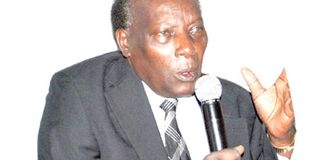Bobi withdrawal a missed opportunity for inquiry into polls

Prof George W. Kanyeihamba
What you need to know:
- In the case of David Tinyefuza vs the Attorney General, Tinyefuza’s lawyers formally asked me to stand down from the case and I refused to do so because their reasons were not valid and my conscience was clear.
By Prof George Kanyeihamba
Presidential elections petitions are governed by Article 104 of the Constitution which provides as follows:-
1. Subject to the provisions of this Article, any aggrieved candidate may petition the Supreme Court for an order that a candidate declared by the Electoral Commission elected as president was not validly elected.
2. A petition under clause (1) of this Article shall be lodged in the Supreme Court registry within 10 days [Editor’s Note. Amended to 15 days in Presidential Elections Act, 2020] after the declaration of the election results.
3. The Supreme Court shall inquire into and determine the petition expeditiously and shall declare its findings not later than 30 days [amended to 45 days] from the date the petition if filed.
5. After due inquiry under clause (3) of this Article, the Supreme Court may:-
(a) Dismiss the petition
(b) Declare which candidate was validly elected, or
(c) Annul the election.
There are many Ugandans, including this writer, who participated in the making of this Constitution but hardly ever ask what we meant by some of the constitutional terms we chose carefully and inserted in the Constitution.
I often hear Ugandans saying they are waiting for the judges to hear the petition or judgments of their lordships in their Supreme Court. All this is wrong. Justices of the Supreme Court do not hear presidential petitions or give judgments. They inquire into them and give findings.
Hearings and judgments apply to criminal and civil proceedings. The Supreme Court justices give their individual findings. It is only when they are giving orders that they act collectively or dissent.
In our judicial system, litigants or lawyers; whether together or individually, have no right to determine and select the panel or the judge to hear their cases. They may challenge the inclusion of one or more judges on the panel to hear their case, but that is how far it goes. It is only the individual judge who can stand down or disqualify himself after considering privately his personal obligations under the law, guided by his judicial oath and integrity.
In the case of David Tinyefuza vs the Attorney General, Tinyefuza’s lawyers formally asked me to stand down from the case and I refused to do so because their reasons were not valid and my conscience was clear. In another case, however, in which Mukwano Industries owned by a friend, the late Karmali, had been a witness, I withdrew from the panel. In another civil case, when retired Chief Justice Samuel S. Wambuzi was challenged by lawyers to withdraw from the case, he declined to do so. In the three cases mentioned, there were no valid grounds or sound reasons advanced to disqualify the cases, but in the case of Mukwano, I was guided by the well-known principle that not only justice must be done, it must be seen to be done.
We shall never know what findings the Supreme Court would have made in the Kyagulanyi petition, but this one we know; Chief Justice Alfonse Owiny-Dollo, while presiding over the Constitutional Court that dealt with the age limit law, wondered how the government had wanted to amend the Constitution so soon even when the ink in which it had been written had not dried. And then after he became Chief Justice, he is on record saying Ugandans made a mistake in removing presidential term limits from the Constitution.
Finally, we know that one Supreme Court judge was ready to entertain Mr Kyagulanyi’s petition favourably.
It is a pity that he was not given a chance, maybe to persuade his colleagues to share his opinion. In the Tinyefuza case, one judge’s opinion was eventually sold to the majority of panellists and that is how it was won. In another criminal case, the late Justice Arthur Oder persuaded the rest of four learned justices to agree with him and acquitted one of the accused who the lower courts had convicted.
Prof George W. Kanyeihamba is a retired Supreme Court judge. [email protected]




